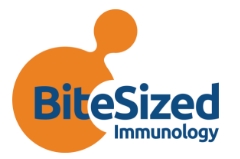BiteSized Immunology: Receptors & Molecules

Host Defence Peptides
Host defence peptides (HDPs) are also known as anti-microbial peptides, although more recently they have been shown to demonstrate a number of other immunomodulatory functions. They were first identified as having antibiotic effects on a wide range of bacteria, fungi and viruses. Most HDPs are cationic, and this is thought to mediate their anti-microbial action by interfering with microbial membranes. However, they are also able to protect host tissues from proteases and regulate innate and adaptive immunity by means of both pro- and anti-inflammatory actions. These actions include immune cell activation, recruitment, chemoattraction and regulation of immunomodulatory molecules such as cytokines and complement.
Host defence peptides are produced by a wide range of immune and epithelial cells in the body and can be expressed constitutively or induced during infection. They are also thought to be one of the most ancient forms of immune defence.
Abnormal regulation of host defence peptides can be associated with disease. For example, high levels of β-defensins are expressed in psoriasis, with low levels occurring in Crohn’s and prostate cancer.

© The copyright for this work resides with the author.
